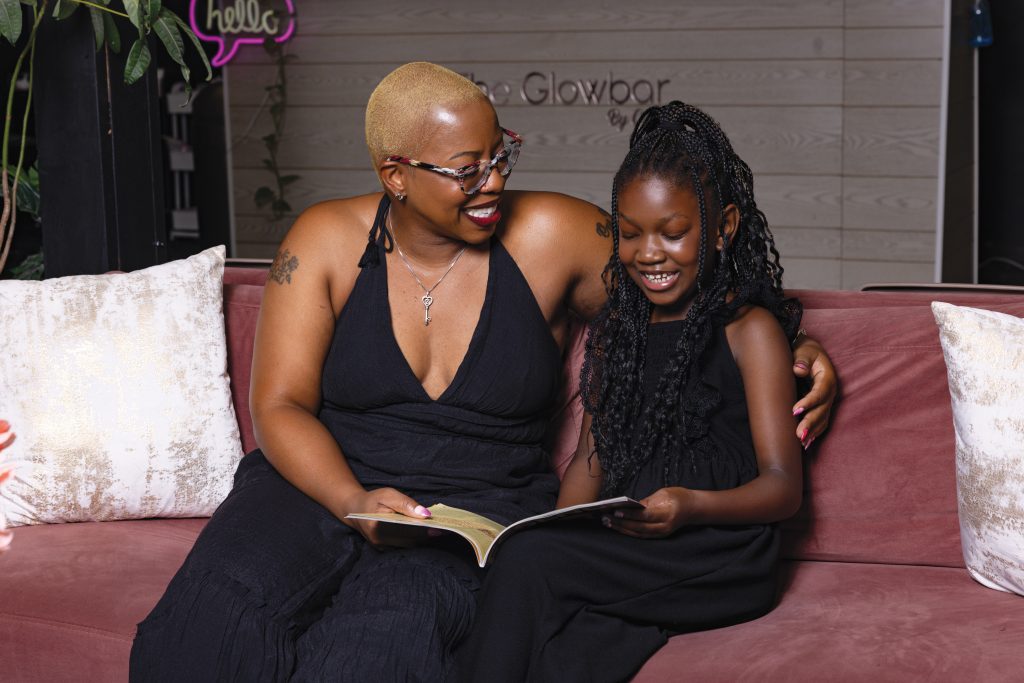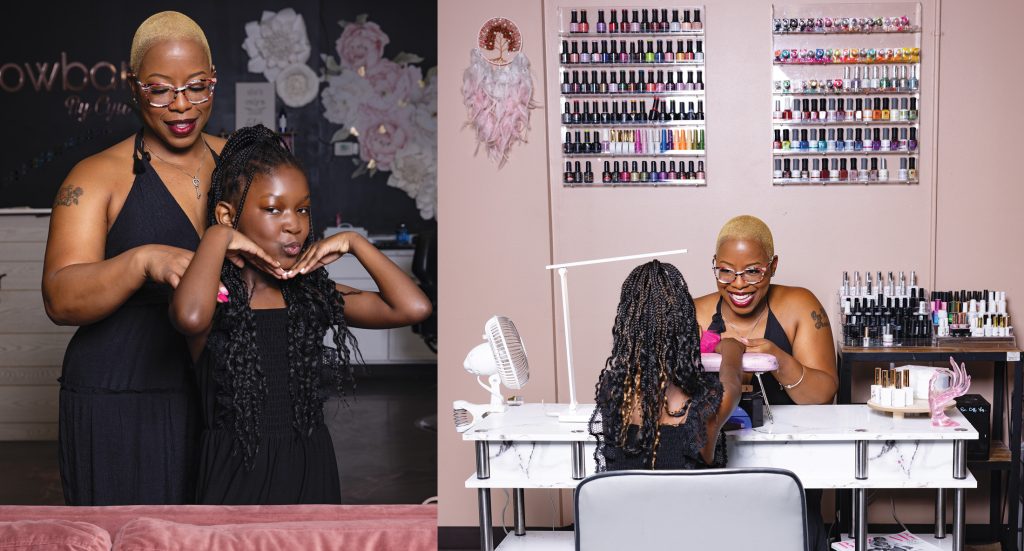A youth and family specialist with the Illinois Department of Juvenile Justice, Beverly Wilcher knows all too well the consequences when children don’t get the care and nurturing they need.
During her 15 years with the department, she has been named Northern District aftercare Specialist of the Year for her work in Chicago’s Englewood neighborhood. The honor recognized her for being “tough and courageous, yet caring and cautious,” and the way in which she “brings laughter when days may seem bleak or stressed.”
But Wilcher’s concern for the well-being of young people goes beyond her day job: for the past seven years she has been mom to Amani, born to relatives who were unable to raise her. As Amani’s legal guardian, Wilcher is part of what Parents magazine has called the “unapologetically Black tradition of expanding the definition of family…”
With a degree in criminal justice from Illinois State University and a master’s in conflict resolution from Dominican University, Wilcher spoke with WayMaker Journal about the professional and personal experiences that have shaped her concern for young people at risk. The conversation has been edited for clarity and length.

WJ: How did you come to take Amani in?
BW: She was about one when I was asked. Prior to that, I always stepped in to assist because they needed help. It honestly just made sense. When they asked, I definitely had to pray about it, because I do not have children of my own and I honestly didn’t want children. So, I had to pray about it, and I had to discuss it with my brother, who raised me, as well as my sister-in-law. They both were like, “Beverly, you know it’s a very big responsibility, but you know that she needs you.” And I knew that she needed me as well, so it was almost a no-brainer. It was like a pay-it-forward situation: my brother had custody of me from the time I was eight until adulthood, and I credit a lot of who I am to him raising me. I was able to not become a statistic, and so I knew it was something that I needed to do for Amani. June 2017 is when I became her legal guardian, and we’ve been rocking and rolling ever since.
WJ: How did your brother come to raise you?
BW: My dad was a lot older when I was conceived and my mom, she was on drugs pretty much all of my life until I was roughly in my mid-20s, and I’m 38 now. I was living with her until I was eight, but it just wasn’t a safe environment. I was not thriving in school; I was on the verge of being held back in fourth or fifth grade. So, my older brother—he’s 56 now—went to my mother and asked her if he could raise me and she agreed to it. I thought I was just going to stay with him for a little while—that’s what my mom told me. But that was not the case; he had me all the way through adulthood.
WJ: What was that experience like for you?
BW: Initially, I had resentment. I did not want to live with him; I wanted to live with my mom, and I could not understand as a child why I had to live with him. So, I was full of anger, full of rage—very, very emotional—and I acted outwardly. But things did start to get better. It wasn’t until I became an adult that I really started to appreciate the magnitude of what he did for me, and how much he sacrificed. He sacrificed a lot for me and my sister; he raised us both. I really attribute the woman that I am today to him and my sister-in-law, Michelle. They did an amazing job and I really thank them.
WJ: You didn’t want to be with them at first. How did they handle that?
BW: They understood that I was coming from a situation where I was literally losing my mother. They immediately got me help; I was in counseling, in therapy, and they addressed my emotional issues that way. They also sat me down; they talked to me. These were different times; they did not spare the rod when needed. And we did not grow up in a home where we were calling DCFS (Division of Children & Family Services) or 911. They reprimanded me when I needed to be reprimanded. They talked to me. They asked me what was going on with me. And they sought help for me.
WJ: How old were you when you came to appreciate what they did for you?
BW: I started to understand that in high school, probably around junior year, but it did not 100% click for me until after I graduated from college—until I was out on my own and I’m realizing like, “Man, I have a great credit score because of them.” They got a credit card for me when I was in school, and they made sure they paid it monthly. They always would tell me, “Beverly, do not open up any credit cards that come to you,” and I always kept that in mind. I did go back to my brother, and I had to apologize to him for the way that I was when I was younger, when I was very rebellious, because I didn’t realize it as a child. I just really wanted to be with my mom… After I graduated college, I realized they really did set me up for success. I’m very grateful to them and I definitely try to show them that daily.
It’s just beautiful to see me making a positive impact on a little person.
BEVERLY WILCHER
WJ: What has it been like raising Amani?
BW: I never thought that I could raise a child, to be honest, because I didn’t want children of my own. But it is a joy to see her blossom into this vibrant little person with all of this personality. She’s singing and dancing and hopping and skipping. When I first got custody of her, she did not talk. I had to get some testing done to make sure that everything was OK; everything was perfectly fine, she just wasn’t in an environment that cultivated that part of her. I love that she sees me as a positive example… She tells me, “Mom, I want to do nails when I get older,” and I’m like, “Really? OK, baby, come back here; let me show you how to do some nails.” I just love that she sees me working out, so she comes in the front with me and she works out. It’s just beautiful to see me making a positive impression on a little person in that way, up close and personal.

I do the best I can to ensure that she’s always in a safe environment, around safe adults.
WJ: What about some of the struggles?
BW: I was a single woman out here living my best life. I thought I was just gonna be the rich auntie; that was the plan. So, it has been a challenge just having to give up my free time. Everything that I do, I have to keep in mind that I have a child, so I can’t just make decisions. Everything is centered around my child. I know that her biological mom’s plan was never to have to give her child up, and I believe she really wanted to raise Amani, but she just couldn’t… there were a lot of issues back and forth with me being the new mom… there were a lot of struggles, a lot of disagreements, a lot of just heartache with [the fact that] we were never co-parenting, but I think her mom and her dad thought we were. So, it was difficult navigating that and getting them to understand that I make all decisions that pertain to Amani’s life. But I’m starting to see the beauty in it now more than I do the hardships because she is becoming older and she’s becoming more independent, so that helps a lot. I am very overprotective because of the things I went through as a child; I never want her to have to go through those things, so I do the best I can to ensure that she’s always in a safe environment, around safe adults, and that in itself is a job.
WJ: Who have been waymakers in your life?
BW: My brother, Clarence Golden, and my sister-in-law, Michelle Golden, naturally. Without them, I absolutely would be nowhere near the woman I am today. So, I thank them. I love them so very much.
WJ: What advice would you give to someone considering helping a young person in some way, as you have?
BW: Definitely sit down and pray about it, for sure. More than anything, I would say this: if it is your family, if you know that you can provide a better outcome for that child or those children than them going to the system, I would say do it. I can tell you right now, DCFS is not the place for any child to be. It’s across the board. These places, these homes, they’re not safe. And if you all can provide a safe environment, absolutely do so. Count up the cost… there are options out there, even if you become a legal guardian, for you to get financial support.
WJ: What needs to be done to keep people out of the juvenile justice system?
BW: What I see a lot of is that our young children, specifically our Black and brown boys and girls, they have issues way before they come to the juvenile justice system. They’re starting in the homes. Unfortunately, a lot of it is the younger parents are not parenting. They’re just kind of letting their kids run wild. We need to get into the homes before the kids are 13, 14, 15 and 16, when they’re having issues at five and six but they’re going unaddressed. Then they’re in these schools, and the schools are just labeling them bad… the schools are backing out, the parents are backing out, and here we have 5-, 6-, 7-year-olds running the streets. We have 8-, 9-, 10-, 11-year-olds in gangs because the supervision is just lacking. We need to address the issues when they’re younger, get these youth the proper help that they need while they are young so that it does not spiral into this huge situation… There’s no stability. They’re living with their friends. Their friends are living with their cousins. We’ve got kids raising kids, raising kids, and that’s not how it should be.


